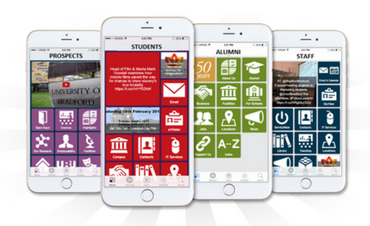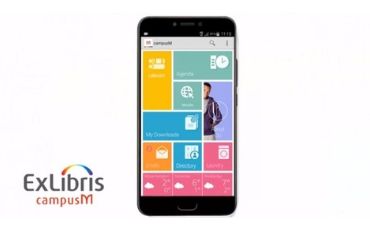Jackie Sherlock, Ex Libris
Let’s face it, student life can be hard. For many students, this is the first time they have left home — and they now find themselves having to organize their own finances and accommodations, making sure there is food in the cupboard and clean clothes in the closet.
And that’s before they even think about going to a class and how they are going to manage their studies.
That’s why dropout rates are so high, particularly during the first semester, as students feel under-prepared and overwhelmed.

If your mobile app is not giving your users what they want as individuals, and delivering it at the right time, you could be missing valuable points of engagement with your students.![]()
I can still remember my first few weeks of university as I ran from one lecture hall to another, registering for classes, organizing housing and crucially sorting out my money. It all passed by in a bit of a blur, and sometimes turning up to class was the last thing on my mind.
This was before smartphones were widely available, so the services my university provided to me on my phone were non-existent.
That’s all changed now. A survey from Alterline found that 98% of students own a smartphone — and a staggering 72% of them say that they would be “unable to live without it.”
Just think about that for a moment. They aren’t saying that their lives would be more difficult if they didn’t have a smartphone — they are saying that they couldn’t live without one.
Maybe it’s not so surprising, though. A report by Deloitte states, “Smartphones will likely increasingly be regarded as the primary way to communicate, interact and transact.”
With this in mind, the top college mobile apps are taking advantage of smartphone technology and are designed to make student life easier than ever before.
In this blog post, we will look at what your students want from their college app — and how you can help make the transition to campus life less difficult by providing them with what they need.
1. Instant Accessibility: “Just get on with it!”
Students are impatient. They live in a world of instant gratification, expecting everything they need to be ready for them whenever and wherever they need it.
The idea of waiting for something is unthinkable to them. As an article in Information Age states, “This generation has a need for speed and expect technology to work at the click of a button or the tap of a screen.” If you aren’t delivering quick access to what they want, your students will either look somewhere else to get it or they’ll think your services aren’t fit for their purpose.
Your college app needs to present information to students at a glance so they can easily see things like what their next class is or whether they have an assignment due just by looking at their app’s home screen.
If students aren’t happy, they will go straight to their social media accounts to complain. Bad news travels fast — and your university’s reputation can be damaged with a few retweets.
Make sure your students have the best experience possible with quick access to everything they need on the device they use every day.
2. Empowered Students: “Let me do it.”
Members of Generation Z value their independence. They don’t want to be spoon-fed; instead, they want to be empowered to do things for themselves.
They don’t rely on their parents for knowledge and support. Instead, they use the internet and technology to find out what they need.
Generation Z students’ attitude to learning is one of independence, too. They want to learn on their own terms, in bite-sized chunks, with 43% preferring a fully self-directed and independent approach to learning. It’s important that they can do this via their mobile device.
Empower your students by making your college systems easy enough for them to use via their phone, so they don’t need to have an instruction manual to be able to get stuff done.
If your mobile app experience is not up to par, then your students aren’t going to use it. They won’t invest time in working out how to use something that should be intuitive.
As Mary Mclaren from Middlesex University London explains: “Students expect their university app experience to be just as good as the other apps they are using every day — and that means being able to access everything they need when on the tube, bus, train or even just walking to campus.”
Your mobile app should be so simple to use that it just works for them. It needs to be easy to navigate and flexible enough to adapt to their needs as they proceed through their studies.
3. Personalization: “Know who I am.”
Individuality is vitally important to all of us, and especially this generation of learners. Today’s students expect you to know who they are and treat each of them as unique.
As Marketing Tech news states, “Gen Zers want to be treated as individuals and not as a homogeneous group. You’ll want to deliver hyper-segmented messages and treat [them] as human beings with individual interests and challenges…”
This is the experience that the best retailers deliver, making the user feel as if the vendor really “knows” who they are.
In college terms, freshmen have very different needs than seniors, and students studying sciences will have a different learning pathway than those in an arts course. Even living on or off campus will give students a unique perspective of college life. The challenge is to give each of these groups information that is tailored to them personally, while making sure they don’t have to go looking for it.
The best college apps give each user an experience as unique as they are, surfacing personalized services directly on the app home screen, so students know that the college has their specific interests at heart.
If your mobile app is not giving your users what they want as individuals, and delivering it at the right time, you could be missing valuable points of engagement with your students.
4. Reliability: “Be there for me when I need you!”
As we saw in the Alterline survey, students love their technology. This is especially the case when it comes to their academic life — with 87% admitting they would struggle to complete their studies without it. They need to trust that the services they will use throughout their student life will be available for them no matter when they need these services, or what device they are using.
Giving them a digital one-stop shop to college systems via their smartphone is a great way to meet them where they are. As Ewie Marais from Miami Dade College explains, “The primary goal with [our app] is to provide our students with a central information hub on their mobile device, where they can efficiently conduct required administrative and student life activities.”
If your college mobile app is fully integrated with your administration systems, students can quickly and easily access all of the services they need directly from their phone. This doesn’t just save your students time; it also frees up your administrative staff to work on other student experience initiatives.
Choose a campus app solution that is truly integrated with your systems and gives them a great experience on any device.
In Summary
If you can get these four aspects right in your mobile app, your students will feel that their lives have gotten a lot easier. You can keep them up to date, engaged and supported throughout their studies, all through their mobile device.
You can expect to see benefits such as improved student success and better usage of services such as your learning management and email systems. Your students can concentrate on turning up to class instead of worrying that they don’t know how to access college systems or waiting in line to update information.
And most importantly, more engaged students are happier students. They are more likely to stay with your college, meaning better retention rates and more successful students.
Follow us on Twitter, LinkedIn, Instagram and Facebook to see how campusM can help your college support your students’ success.
July 22, 2019






